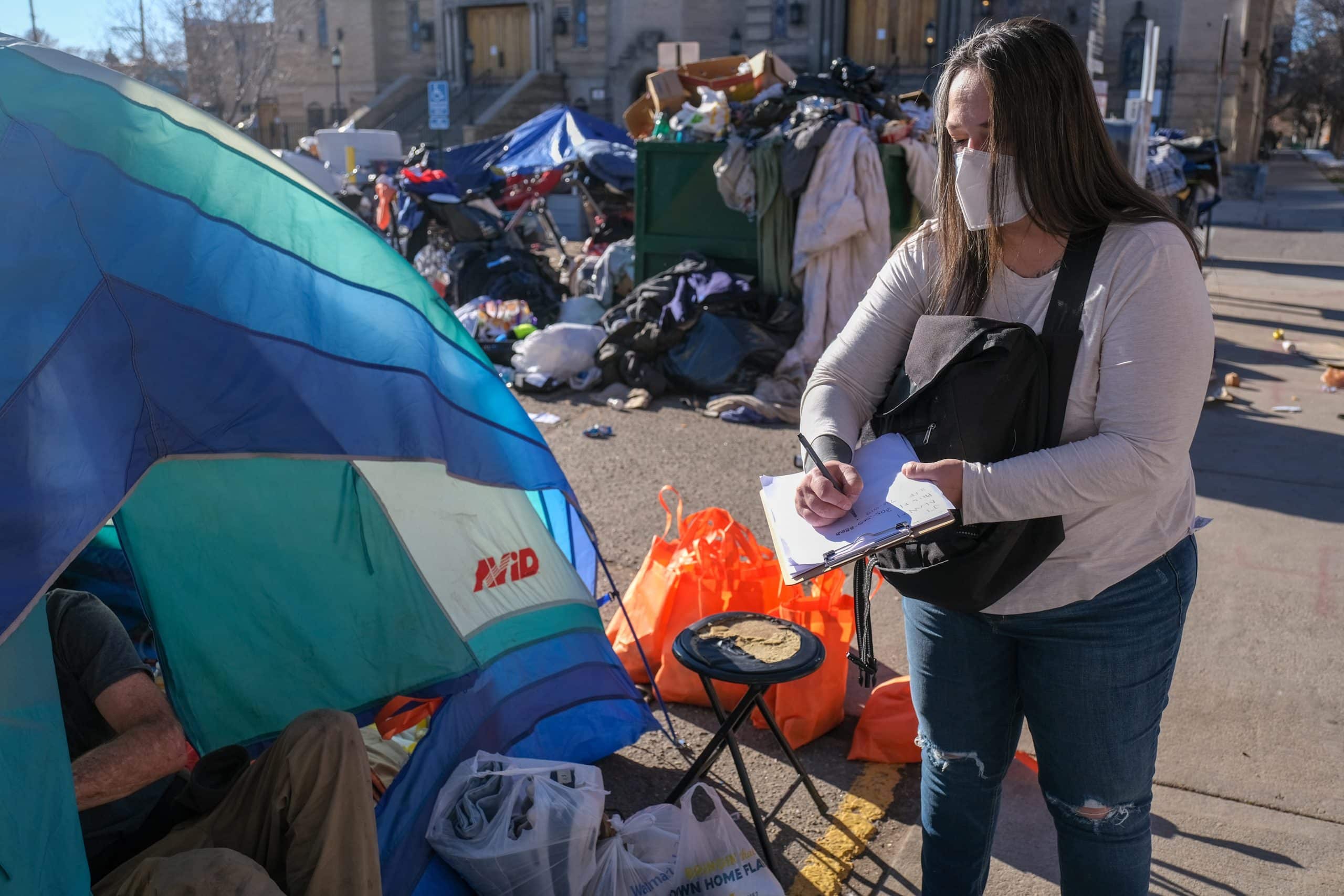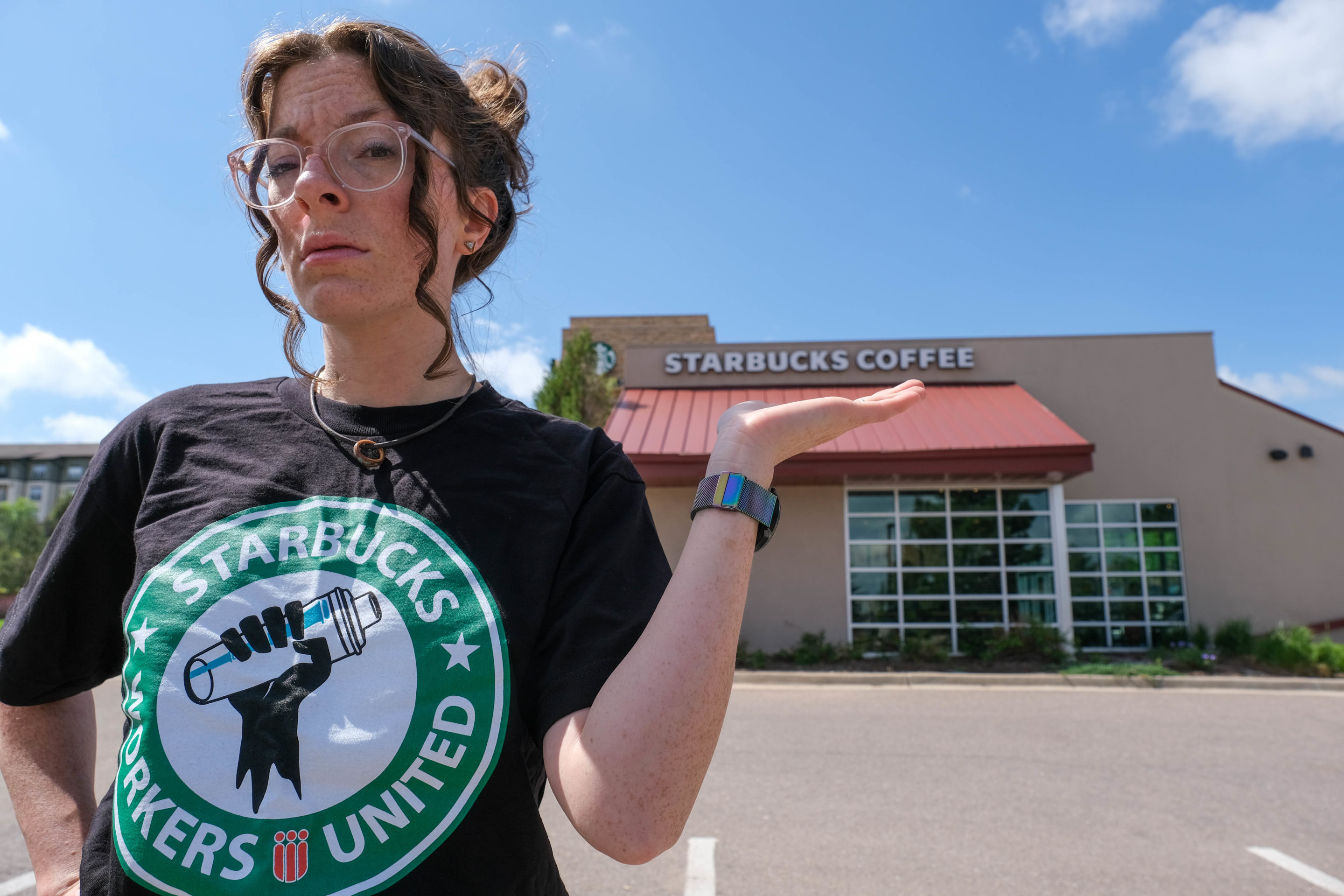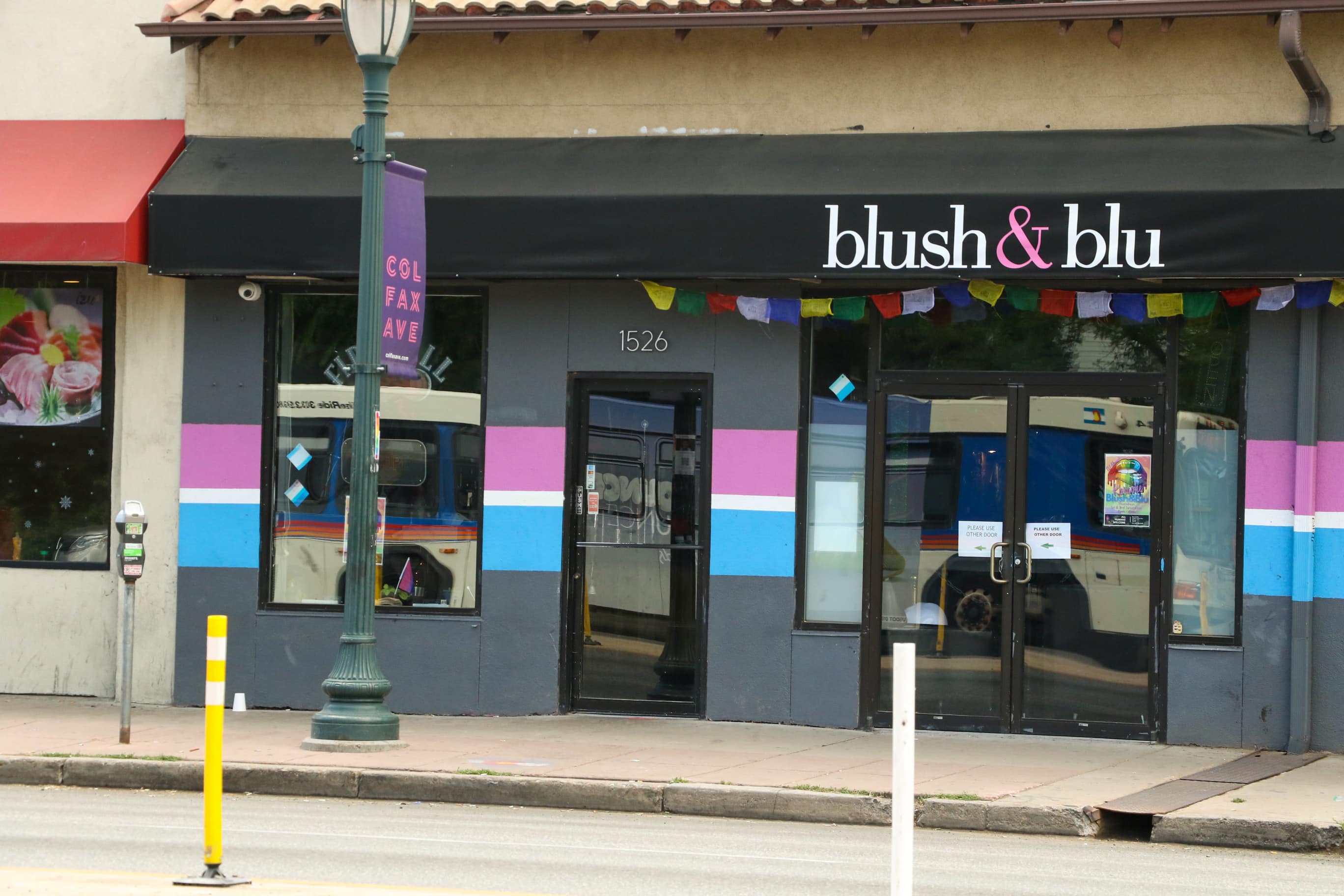//Cuica Montoya speaks to one of the residents of the houseless encampment at 16th and Pearl about the city-sanctioned encampment due to open nearby, next to the Denver Community Church. Photo by Esteban Fernandez | [email protected]
Update: Robert Vazquez no longer works with Cuica Montoya. He now works at the men’s shelter at the Coliseum. Vazquez does still live in the Beloved Community Village.
Denver is no stranger to the houseless crisis that is growing daily across the United States. In fact, according to The State of Homelessness 2020 report, at least 31,207 people in Denver alone are houseless. However, that number only accounts for those who are counted through their use of various city resources.
While the houseless crisis was very much apparent prior to the global pandemic, the impact COVID-19 has had on resources and shelters. It has also made clear that the city needs a way to help those living on the street that doesn’t include massive street sweeps that bounce them from place to place. That is why Cuica Montoya, the Outreach and Wellness Program manager at Colorado Village Collaborative, led the charge for one of Denver’s first sanctioned camps.
“Creating a safer alternative to unsheltered homelessness is our goal while providing a dignified way of taking care of people sleeping outside during a global health crisis, ” Montoya said. “Safer for the people, safer for the neighborhoods, and ultimately safer for the city.”
The nonprofit lobbied for a camp where people experiencing houselessness during the pandemic could find shelter, showers, and bathrooms while accessing connections for jobs, housing, and health support. As the camp was being built, Montoya was also out on the streets, in the parks and alleys of the Mile High city, talking with people living in unsanctioned camps to see who might want to move to this new alternative.
While being a native to Denver gives Montoya knowledge of our city, it’s not only her roots that qualify her to handle a project like this. Montoya has the first-hand experience having been houseless herself.
“If someone had told me I would have ended up living outside, I would have laughed in their face,” Montoya said.
Growing up in a middle-class Park Hill neighborhood, Montoya was once a successful commercial real estate agent. She met a man, fell in love, bought a house at 25, and gave birth to her daughter. However, the American dream that was Montoya’s life began to unravel.
“My husband and I were more focused on the materialistic parts of our life and failed to build a foundation. So when he left me for another woman, I fell into a dark depression,” Montoya said.
Unresolved trauma from her past and her own inability to open up about her struggle with mental health after witnessing how her mother was treated during similar situations, Montoya found herself in an unmitigated downward spiral. She lost her job and home and had to rely on her family and her daughter’s father for help, something she had fought hard against. When she and her ex-husband had another falling out, she had nobody left to turn to for support, and Montoya began to truly experience housing instability.
“Houselessness is such a traumatic experience, and to roll into it with untreated mental health issues, it can feel like there is no light at the end of the tunnel,” Montoya said.
She turned to drugs and alcohol to help her avoid her new reality. Her addiction took hold, leading to three years living on the street and, ultimately, a stint in jail.
“I had a surreal moment in my cell where I finally woke up. I knew I needed to do something different and to find a way to support myself in order to get out of this. I needed to figure out who I was without all the things that had once convinced me I was worthy,” Montoya said.
Finding a way out of houselessness is no easy task. Montoya had to figure out how to get an income and stable housing while also wondering what she would eat that day and where she would sleep. But she was determined, and with her naturally extroverted personality, she went from being a burrito maker at Illegal Petes to joining Colorado Village Collaborative as the Outreach and Wellness Program manager.
While there are resources in place to assist, they aren’t easy to access, especially during the current global pandemic. Hour-long lines at shelters often result in being turned away due to capacity restrictions. Denver Public Libraries, which have served as a warm place for many houseless people to go to during the day, have been closed due to COVID safety measures. Medical assistance is only made available to those who are at the shelter, eliminating many who can’t get in or have chosen to stay outside so they aren’t separated from their families.
“There isn’t an organization in Denver that does it all, so it can make accessing support exhausting. And the truth is the shelter is not an option for everyone,” Montoya said. ”We need an option that not only presents a safe alternative for those sleeping outside but also that keeps peace with the residents of this city.”
The camp, which opened up this month, will be monitored with a 24/7 team of staff and protected with a fencing system. Each person will be provided with a matching tent, access to trash service, and necessary items to offer them comfort and help decrease trash build-up.
Robert Vazquez, a member of the Beloved Community Village tiny home community that supports those transitioning out of houselessness, has credited Montoya for helping him and for bringing him on to help others.
“Those experiencing houselessness all have different stories and reasons for being there—past trauma, mental health problems. They’re not all ‘just junkies,’ and Cuica understands that. This camp is very important and I am honored to be working beside her on this,” Vazquez said.
The camp will be a stepping stone for those looking for some support during a time of their life that can feel hopeless. While living on the streets hadn’t been part of her plan, Montoya knows now that the path she took was what led her to her life’s purpose. She hopes this camp also serves as a reminder to everyone that a little support and compassion go a long way when addressing the nationwide issue of houselessness.
“Imagine trying to pull yourself out of the hardest moment of your life while being judged by others every minute of the day,” Montoya said. “We need to start working together as a community and shift away from the individualist cycle of blame that we’re in right now if we’re going to really change things.”





Great article! It’s inspiring to see people like Montoya helping others after everything she’s gone through.